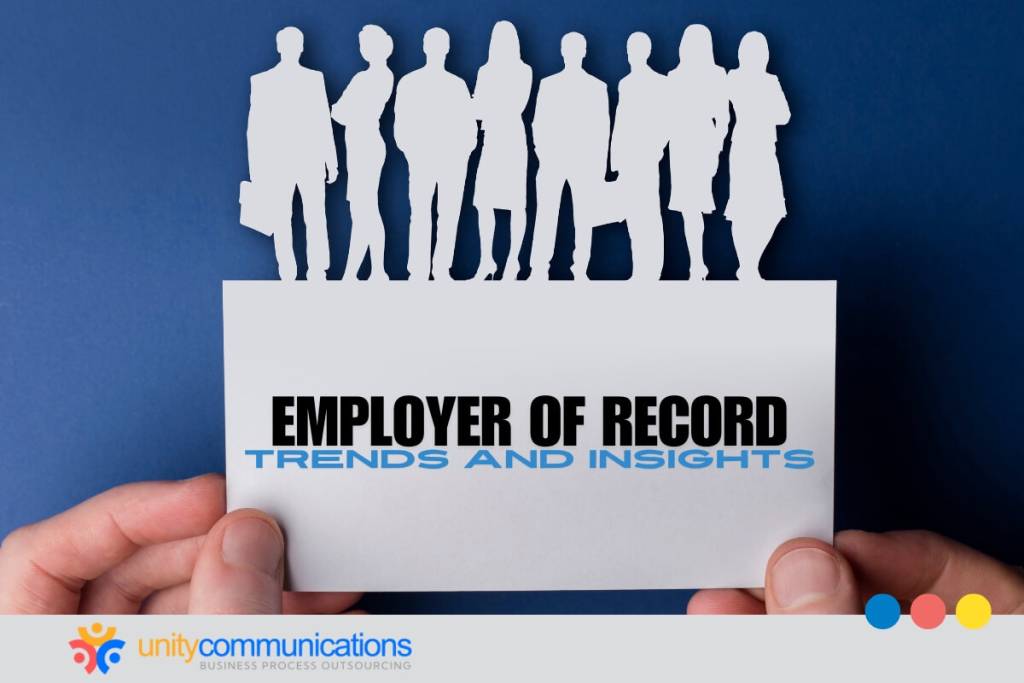IN THIS ARTICLE
Table of Contents
Employer of record (EOR) services are becoming widespread among companies seeking efficient ways to manage international employment. An EOR provider streamlines human resources (HR) functions and ensures compliance with local labor laws, optimizing workforce management and global expansion.
This guide explores the EOR industry and the emerging trends that influence business operations worldwide. Continue reading to learn valuable insights into the impact employer of record services.
The rise of the EOR industry

Valued at $1.89 billion in 2022, the global EOR market can achieve a compound annual growth rate (CAGR) of 12.07% and reach $3.74 billion by 2028. These figures are due to critical factors such as globalization, remote work adoption, and the popularity of the gig economy.
Globalization compels companies to hire employees across borders, relying on employer of record services to overcome diverse legal and regulatory challenges. The surge in remote work, partly due to tech advancements and the COVID-19 pandemic, also amplified the demand for EOR solutions to manage a dispersed workforce.
On the other hand, the gig economy’s continued growth indicates an increase in freelance and contract work. Companies partner with EOR firms to handle the complexities of gig hiring.
These EOR industry trends and insights collectively highlight the sector’s crucial role in enabling businesses to operate more flexibly and efficiently worldwide.
Key EOR industry trends and insights

The EOR industry evolves in response to changing work models, technological advancements, and global economic shifts. Below are the primary trends that continue to shape the robust sector:
Global expansion and localization
Businesses expand globally to access diverse talent, broaden market reach, and drive growth. Partnering with workforce management experts such as an EOR or a professional employer organization (PEO) is crucial for success.
When comparing an employer of record and a PEO, an EOR is often preferable for international expansion as PEO offers localized expertise. An EOR enables companies to quickly establish a presence in foreign markets without creating legal entities. An EOR also simplifies navigating complex employment laws and tax requirements, reducing the risk of non-compliance.
Here are examples of companies that have utilized EOR services for global expansion and localization:
- Airbnb. The homestay and experiences marketplace used EOR services to navigate complex regulations in markets such as China, allowing for rapid scaling without creating local legal companies.
- Uber. The U.S.-based ride-sharing company leveraged EOR solutions to comply with local labor laws and tax regulations during early expansion into Latin America and Southeast Asia.
- Alibaba. The e-commerce company relied on EOR services to manage local talent and operations effectively while expanding into Europe and North America. An e-commerce virtual assistant can be the best solution to support an online retail store like Alibaba.
These examples illustrate how EOR services can streamline global expansion, allowing businesses to focus on growth while ensuring compliance with local regulations.
Technological advancements in EOR
Technological advancements are changing EOR services, making them more efficient, accurate, and scalable. Innovations such as artificial intelligence (AI)-powered analytics, automated payroll, and cloud-based document management enhance HR capabilities, ensure compliance, and improve service quality.
The following tools allow EOR providers to better support global businesses in effectively managing their workforce.
- Automated payroll processing. Automation tools streamline payroll tasks by automatically calculating salaries, taxes, and deductions, reducing errors, and ensuring compliance with local labor laws.
- Digital onboarding portals. Advanced HR software provides digital onboarding platforms where new hires can complete paperwork electronically, access training materials, and receive customized welcome kits in their preferred language.
- AI-powered employee analytics. EOR providers use AI-driven analytics tools to monitor employee performance, engagement, and turnover trends, helping businesses make data-informed decisions to optimize workforce management.
- Cloud-based document management. Cloud technology enables secure storage and easy access to employee documents, contracts, and compliance records, ensuring that HR teams can manage and retrieve important information anywhere.
- Global time tracking systems. Integrated time-tracking software allows businesses to accurately record employee working hours across different regions, ensuring compliance with local labor regulations and simplifying payroll processing for remote teams.
Technological advancements allow EOR providers to offer more efficient, accurate, and scalable solutions, improving overall service quality and client satisfaction.
Employee experience focus
One of the benefits of EOR is enhancing employee experience and developing their services to meet workers’ expectations. For instance, EOR firms now include cultural integration in onboarding, offering resources and social activities to help new hires quickly adapt to the company culture.
Here are ways EOR providers enhance employee experience:
- Cultural integration programs. EOR firms facilitate onboarding with cultural orientation and activities that help new hires quickly adapt to company culture.
- Personalized benefits packages. EOR providers offer tailored benefits that address individual employee needs, such as flexible work arrangements and wellness programs.
- Continuous engagement initiatives. Regular engagement activities and feedback mechanisms, such as virtual team-building and performance check-ins, keep employees motivated and connected.
- Clear communication channels. EOR services provide online portals and training to ensure employees understand company policies and have channels to share ideas or raise concerns.
- Enhanced remote onboarding. Onboarding with an employer of record involves digital tools, virtual tours, online training, and interactive welcome kits.
By focusing on the above factors, EOR providers create a positive work environment that helps businesses attract and retain top talent while maintaining high productivity and morale across their global workforce.
Sustainability and corporate responsibility
EOR firms are increasingly adopting sustainable practices and ensuring fair labor standards, which align with the demands of socially conscious clients and employees. Many now offer telecommuting to reduce carbon emissions by up to 29% and implement green policies such as proper waste management.
Here are some examples of EOR firms’ sustainability efforts:
- Telecommuting options. They offer remote work to reduce the carbon footprint from commuting and office energy use.
- Green policies. The EOR can implement sustainable waste management practices, such as recycling programs and single-use plastics reduction.
- Energy-efficient offices. They promote energy-saving technologies such as LED lighting and smart thermostats to reduce energy consumption.
- Sustainable procurement. EOR firms source supplies from vendors that follow environmentally friendly practices.
A stronger commitment to sustainability and corporate responsibility enhances the reputation of EOR providers and meets the evolving expectations of clients and employees.
Flexibility in workforce management
The rise of the gig economy and non-traditional work arrangements has led EOR providers to offer more flexible solutions. EOR firms now manage contingent workers, freelancers, and part-time employees, allowing businesses to scale their workforce according to demand.
EOR providers in the business process outsourcing (BPO) industry ensure compliance with complex labor laws in BPO by managing the legal and regulatory aspects of employing workers across different regions. This service allows BPO companies to focus on their core operations while mitigating risks associated with local employment regulations.
The following are ways EOR providers support flexible workforce management:
- Management of contingent workers. EOR services handle onboarding and compliance for temporary or contract workers, ensuring smooth team integration.
- Support for freelancers. EOR firms manage administrative tasks such as contract management and payment processing, simplifying engagement with freelance workers.
- Part-time employee administration. EOR providers manage part-time employees’ payroll, benefits, and compliance, ensuring adherence to labor laws.
- Flexible work arrangements. EOR services support remote work, flexible hours, and other non-traditional work arrangements, accommodating diverse working styles and preferences.
An EOR’s flexibility allows companies to respond more effectively to market changes and operational needs.
Customization for industry-specific needs
EOR providers are tailoring their services to meet the unique demands of various industries. Whether in healthcare, technology, or manufacturing, EOR firms develop specialized solutions that address industry-specific challenges, ensuring regulatory compliance, addressing skills shortages, and enabling rapid scaling.
EOR firms support the following industries:
- Healthcare. EOR firms manage compliance with healthcare regulations, handle credentialing for medical professionals, and offer specialized benefits for healthcare workers.
- Technology. EOR services support the tech industry with flexible staffing for project-based work and manage intellectual property considerations.
- Manufacturing. Third-party EOR firms ensure compliance with safety regulations, coordinate shift work, and handle seasonal workforce fluctuations.
- Retail. EOR firms streamline onboarding and manage temporary staff to address high turnover rates and seasonal hiring during peak periods.
- Finance. EOR services navigate complex financial regulations, offering specialized training and support for finance sector employees.
These customized solutions ensure businesses receive the support they need to succeed in their specific markets.
Effects of EOR industry trends on businesses

The EOR industry trends and insights discussed above significantly affect businesses that use EOR services as part of their global expansion strategy. First, organizations can leverage remote work and digital transformation to access a broader talent pool and enter new markets without setting up physical offices.
Second, companies can scale operations more efficiently and respond quickly to changing market dynamics. Third, advancements in technology and compliance automation alleviate the administrative burden associated with managing global workforces, allowing businesses to focus on core operations and strategic growth initiatives.
Fourth, improving the employee experience and cultural integration ensures that businesses can develop a positive work environment and enhance the engagement and productivity of diverse teams.
Overall, these EOR industry trends highlight the value of their services for businesses looking to expand globally. They offer comprehensive solutions to navigate the complexities of international employment while driving sustainable growth and competitive advantage.
The bottom line
EOR providers address evolving needs by offering comprehensive solutions for global expansion, compliance management, and talent acquisition. As businesses face the complexities of a rapidly changing global economy, the strategic adoption of EOR services can drive sustainable growth, organizational resilience, and competitiveness.
Let’s connect if you want to partner with an EOR who is knowledgeable about the latest industry trends and insights.





